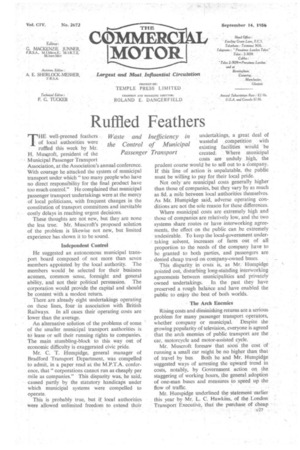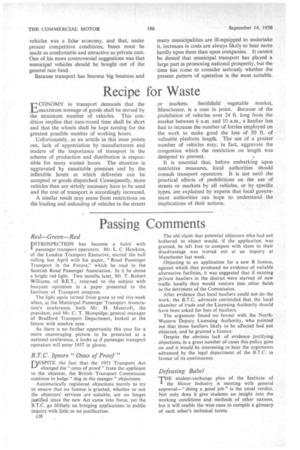Ruffled Feathers
Page 77

Page 78

If you've noticed an error in this article please click here to report it so we can fix it.
Waste and Inefficiency in the Control of Municipal Passenger Transport
MITE well-preened feathers of local authorities were ruffled this week by Mr. H, Muscroft, president of the Municipal Passenger Transport Association, at the Association's annual conference. With courage he attacked the system of municipal transport under which "too many people who have no direct responsibility for the final product have too much control." He complained that municipal passenger transport undertakings were at the mercy of local politicians, with frequent changes in the constitution of transport committees and inevitable costly delays in reaching urgent decisions.
These thoughts are not new, but they are none the less true. Mr. Muscroft's proposed solution of the problem is likewise not new, but limited experience has shown it to be sound.
Independent Control He suggested an autonomous municipal transport board composed •of not more than seven members appointed by the local authority. The members would be selected for their business• acumen, common sense, foresight and general ability, and not their political persuasion. The corporation would provide the capital and should be content with a modest return.
There are already eight undertakings operating on these lines, four in association with British Railways. In all cases their operating costs are lower than the average.
An alternative solution of the problems of some of the smaller municipal transport authorities is to lease or sell their running rights to companies. The main stumbling-block to this way out of economic difficulty is exaggerated civic pride.
Mr. C. T. Humpidge, general manager of Bradford Transport Department, was compelled to admit, in a paper read at the M.P.T.A. conference, that" corporations cannot run as cheaply per mile as companies." This disparity was,. he said, caused partly by the statutory handicaps under which municipal systems were compelled to operate.
This is probably true, but if local authorities were allowed unlimited freedom to extend their undertakings, a great deal of wasteful competition with existing facilities would be created, Where municipal costs are unduly high, the prudent course would be to sell out to a Company.
If this line of action is unpalatable, the public must be willing to pay for their local pride.
Not only are municipal costs generally higher than those of companies, but they vary by as much as 8d. a mile between local authorities themselves. As Ms. Humpidge said, adverse operating conditions are not the sole reason for these differences.
Where municipal costs are extremely high and those of companies are relatively low, and the two systems share routes or have interworking agreements, the effect on the public can be extremely undesirable, To keep the local-government under, taking solvent, increases of fares out of all proportion to the needs of the company have to be granted to both parties, and passengers are . denied cheap travel on company-owned buses.
This disparity in costs is, as Mr. Humpidge pointed out, disturbing long-standing interworking agreements between municipalities and privately owned undertakings. In the past they have preserved a rough balance and have enabled the public to enjoy the best of both worlds.
The Arch Enemies Rising costs and diminishing returns are a serious problem for many passenger transport operators, whether company or municipal. Despite the growing popularity of television, everyone is agreed that the arch enemies of public transport are the car, motorcycle and motor-assisted cycle.
Mr. Muscroft foresaw that soon the cost of running a small car might be no higher than, thatof travel by bus Both he and Mr. Humpidge suggested ways of arresting the upward trend in costs, notably, by Government action on the staggering of working hours, the general adoption of one-man buses and measures to speed up the flow of traffic.
Mr. Humpidge underlined the statement earlier this year by Mr. L. C. Hawkins, of the London Transport Executive, that the purchase of cheap c27 vehicles was a false economy, and that, under present competitive conditions, buses must be made as comfortable and attractive as private cars. One of his more controversial suggestions was that municipal vehicles should be bought out of the general rate fund.
Because transport has become big business and many municipalities are ill-equipped to undertake it, increases in costs are always likely to bear more hardly upon them than upon companies. It cannot be denied that municipal transport has played a large part in promoting national prosperity, but the time has come to consider seriously whether the present pattern of operation is the most suitable.












































































































































































































